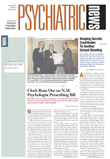Representative Fortney “Pete” Stark (D-Calif.) blasted the Bush administration’s proposed tax cuts as being potentially lethal to real Medicare reform. In a speech to members of the American Association for Geriatric Psychiatry (AAGP) last month in San Francisco, Stark said the tax cuts, if enacted, will leave no funds available to address several priorities in Medicare reform, including full parity for mental illness.
Stark, the former chair and now senior Democratic member on the Health Subcommittee of the House of Representatives Ways and Means Committee, shared what could be described as a rather gloomy outlook, yet he professed to be optimistic.
“Because of the fairly even division of power, that augers for some compromise,” Stark said during the Presidential Plenary at the AAGP’s 14th annual meeting last month (
see story on next page) “But it also means that we won’t be going very far from the norm. We won’t go very far to the right, we won’t go very far to the left—we can’t.”
Stark expressed consternation with the Bush administration’s insistence on a tax cut of nearly $1.6 trillion, which the Democrats believe will cost closer to $2.6 trillion.
“If we cut taxes, we cut what the government can do,” Stark said, “and if those projected surpluses don’t materialize, and I don’t think that they will, we’re going to have a lot of trouble getting the revenue back to put things back together. So, what does that mean?”
It means, he told the crowd of about 800, that the Medicare Trust Fund is at risk, and as such so are the reforms that are so important to Medicare beneficiaries.
Medicare Reform
Stark is preparing new legislation that will be more comprehensive than the Medicare Mental Illness Nondiscrimination Act of 2001 introduced in the House in February by Rep. Marge Roukema (R-N.J.).
“I hope,” Stark said, “that my bill for full mental health parity in Medicare—I don’t have any hope of taking on the private insurers or workplace insurers—will be successful so that we can get those copays down from 50 percent to 20 percent.”
Stark also hopes to be able to deal with “the partial-hospitalization issue,” establishing a system that would allow reimbursement for limited services.
“Extended and assisted living is something in every community today,” Stark continued, “but it is completely unregulated. But for them [assisted living facilities] to constantly reach out to those people who are more fragile and then provide them with health care without any direction or any restrictions on who will provide it and who will be responsible for such things as medications or calling in the proper health care providers is simply plain wrong.”
Stark has sponsored legislation (HJ Res 13) that would convene a White House conference to discuss and develop national recommendations concerning the quality of care in assisted living facilities.
“For Medicare reform, the idea that we’re going to find something more efficient in the current for-profit HMO world is unlikely,” Stark said. “Profit has no place in the delivery of medicine, especially when all of you [geriatric psychiatrists] are dealing with the very people who are the most afraid, the most scared, and have the most limited ability to make the decisions in their health care that the free market requires of them.”
21st-Century Health Care
Stark argued that “true 21st-century health care” cannot be provided without a prescription-drug benefit, noting that “many of the great scientific advances” in health care in the future are likely to come from the pharmaceutical industry. Nonetheless, he said, “we are not likely to get it.” The reason is the pharmaceutical industry itself, which, he said, has the strongest, most organized lobby in Washington D.C.
“I’m sorry,” Stark told the group, which as is common among medical conferences today, relied on an unrestricted grant from a pharmaceutical company to pay for the dinner at which he was speaking, “but many of your sponsors in the pharmaceutical industry will spend hundreds of millions of dollars to prevent any meaningful prescription drug benefit.”
It makes sense, Stark explained, for the drug companies to oppose any benefit plan that has the potential to control drug prices. “They can charge whatever the traffic will bear now, and they have absolutely no responsibility to commit to reducing or controlling costs. Certainly they would want the government to pay a benefit, but with no controls in place.”
Another task, Stark said, is to work toward significant protections framed by a patients’ bill of rights. Patients should have the right, he continued, to sue their insurers in their state courts regarding medical-access decisions made in bad faith. He has high hopes for passage of a patients’ bill of rights in this session of Congress; “however, significant compromise is going to have to happen” to achieve passage of meaningful legislation.
Fundamental Rights
The essentials of a 21st-century health care system are easy to understand, Stark told the group. First, every individual in the country should have access to good quality medical care; second, every provider of this medical care should have reasonable compensation for services; and third, each individual should pay for care according to his or her ability to pay.
“Once we’ve got all that together, maybe by the end of the century we’ll do what so much of the rest of the world has managed to do by the beginning of the century, and that is, to provide overall medical care to all citizens, the best care that each country has to offer.”
Information on Stark’s positions and proposed legislation can be found at his Web site, www.house.gov/stark/. Information on the AAGP’s activities can be found at www.aagponline.org. ▪

